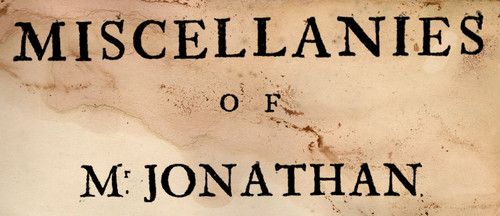
unearths some literary gems.
***
To the Editor of the Pall Mall Gazette.
SIR,—I am deeply distressed to hear that tuberose is so called from its being a ‘lumpy flower.’ It is not at all lumpy, and, even if it were, no poet should be heartless enough to say so. Henceforth, there really must be two derivations for every word, one for the poet and one for the scientist.
***
I have been told that the ambition of every Dramatic Club is to act Henry IV….Rumour, from time to time, has brought in tidings of a proposed production by the banks of the Cam, but it seems at the last moment Box and Cox has always had to be substituted in the bill.
***
Mr. E. O. Pleydell-Bouverie has endowed the novel-writing fraternity with a new formula for the composition of titles. After J. S.; or, Trivialities there is no reason why we should not have A. B.; or, Platitudes, M.N.; or, Sentimentalisms, Y.Z.; or, Inanities.
***
All But is certainly an intolerable name to give to any literary production.
***
After the Comédie Humaine one begins to believe that the only real people are the people who have never existed.
***
Nor is Mr. Quilter’s manner less interesting than his matter. He tells us that at this festive season of the year, with Christmas and roast beef looming before us, ‘Similes drawn from eating and its results occur most readily to the mind.’ So he announces that ‘Subject is the diet of painting,’ that ‘Perspective is the bread of art,’ and that ‘Beauty is in some way like jam’; drawings, he points out, ‘are not made by recipe like puddings,’ nor is art composed of ‘suet, raisins, and candied peel,’ though Mr. Cecil Lawson’s landscapes do ‘smack of indigestion.’ Occasionally, it is true, he makes daring excursions into other realms of fancy, as when he says that ‘in the best Reynolds landscapes, one seems to smell the sawdust,’ or that ‘advance in art is of a kangaroo character’; but, on the whole, he is happiest in his eating similes, and the secret of his style is evidently ‘La métaphore vient en mangeant.’
***
[from some author’s list of behavior to be avoided]
Entertaining wild flights of the imagination, or empty idealistic aspirations.
[writes Wilde:]
I am afraid that I have a good deal of sympathy with what are called ‘empty idealistic aspirations’.
***
It is a curious thing that when minor poets write choruses to a play they should always consider it necessary to adopt the style and language of a bad translator.
***
The Chronicle of Mites is a mock-heroic poem about the inhabitants of a decaying cheese who speculate about the origin of their species and hold learned discussions upon the meaning of evolution and the Gospel according to Darwin. This cheese-epic is a rather unsavoury production and the style is at times so monstrous and so realistic that the author should be called the Gorgon-Zola of literature.
***
There is a great deal to be said in favour of reading a novel backwards. The last page is, as a rule, the most interesting, and when one begins with the catastrophe or the dénoûment one feels on pleasant terms of equality with the author....One knows the jealously-guarded secret, and one can afford to smile at the quite unnecessary anxiety that the puppets of fiction always consider it their duty to display.
***
Books of poetry by young writers are usually promissory notes that are never met.
***
Mr. Yeats does not try to ‘out-baby’ Wordsworth, we are glad to say.
***
The Philistine may, of course, object that to be absolutely perfect is impossible. Well, that is so: but then it is only the impossible things that are worth doing nowadays!
***
Last night, at Prince’s Hall, Mr. Whistler made his first public appearance as a lecturer on art, and spoke for more than an hour with really marvellous eloquence on the absolute uselessness of all lectures of the kind.
***
There were once two painters, called Benjamin West and Paul Delaroche, who rashly lectured upon Art. As of their works nothing at all remains, I conclude that they explained themselves away.
***



